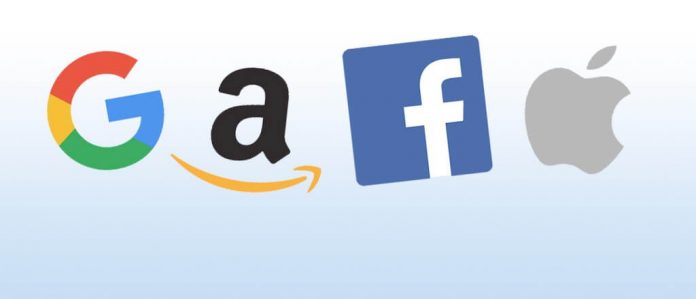This article is authored by Upasana Dash, currently pursuing B.A. LLB at Madhusudan Law College, Odisha. This is an exhaustive article which deals with the Competition Law issues faced by big companies (Facebook, Amazon, Apple, Google).
Table of Contents
Introduction
The term “competition” is not defined in Indian Competition Act. it is typically understood to mean the process of competition to attract more customers or to intensify profit. In some dominions such as the US, some experts have defined competition law as the law that stimulates or supports market competition by controlling antitrust competitive behavior by companies. In the beginning, it may seem that the Competition Law and IPR look they manage at different fields and several aims. Competition may also cheer a drive for revolution as comes to absolute to utilize first-mover primacies. The regime of Competition Law can function to upgrade consumer’s welfare in the same manner.
The digitalization of the modern economy passes new scores for lawmakers and dispute resolution bodies. It is foreseen that the said digitalization will affect several industries and parts of the economy. Particular observation is produced to the digital manifesto which is understood as tools, software, products, and information services through which relation between consumers and suppliers and of various goods and services is carried out. The property that makes digital manifestos so interesting is noted as the market effects.
The network effect is firmly related to the objective that the value of each consumer of a fixed product is certainly clamped to the number of consumers of this product. Numerous examples of antitrust analysis into Google, Facebook, and Microsoft show that digital platforms in the market can significantly obstruct competition. Concurrently, there are presumed complications in separating legal conduct from illegal conduct on the part of the seller who are participants in such markets.
Parameter for competition
While specific contractual arrangements such as cartels are freely gained into by the contracting parties, they are not beneficial to competitive markets. Competition Policy must somehow make sure a society sets relevant criteria of competitive behaviour, to ensure the interest of the consumer is secured.
Dominance and monopoly
When a company has absolute selling, trading, and dealing capacity, the need for competition entitles the seller to fix the price of the commodity at an artificially high rate for an unlimited period of time.
Mergers and acquisitions
When competitors merge either through a fusion or through a scale, there is always a chance of competition as the consumer has limited choices.
Collusion
A type of merger usually wanting clarity in which rival companies work together towards a common end, most often the companies commit malicious deception (wage-fixing or other illegal activities).
Cartels
A type of conspiracy in which a small number of sellers agree to control a market in order to fix wages or prices or to supply offers.
Price fixing
Agreement in which at least two sellers decide to trade a product at the same price (typically a puffed up price) to secure both profits. The least price-fixing can also be an element when larger participants sell below manufacturing costs long enough to put smaller participants out of business but re-inflate the price when consumers no longer have a choice.
Product tying
Ordinary in software packages (office suits) and cable or communication companies, bundling takes place when products are solely sold as a package deal, or when companies decline to sell bundled products separately.
Refusal to deal
When competitors assure suppliers not to sell or to regulate the supply of goods to their opponent.
Exclusive dealing
This market hindrance occurs where a distributor has a sole selling power to dispensers or wholesalers in a specific territory.
Tender supplying
A type of price-fixing in which competitors accept amongst themselves to underbid, turn who wins the tender, or otherwise make the bid process unreal.
Splitting market
Agreements between competitors to do business only in particular territories, or with particular customers or products. In this case, Company ‘A’ gives his consent to only sell in the northern part of a marketplace, and Company ‘B’ only sells in the south.
The story behind antitrust issues
Online ad market and big data, the giants of Silicon Valley, together with Amazon, Apple, Facebook, and Google, are facing an unusual challenge, calls by lawmakers to check their market monopoly controls. There are two causes of stress linking with these four tech firms that have caused distress across the United States, Europe, and elsewhere; first that they may have involved in anti-competitive conduct over many years thus underbidding smaller dormant rivals and supporting onto a gross market share; and second, that as a result of this upheaval growth, they now have a huge impact on politics, policy, and personal reputations across the scope, making the cost of data privacy contraventions by these firms tragic. Therefore, in July 2019 the United States Justice Department and the House Judiciary Committee separately declared major antitrust investigations into Google, Facebook, Amazon, and Apple encouraging a “top-to-bottom review of the market power held by giant tech platforms”.
What are the main concerns with each platforms?
Amazon
Stated the troublesome effect of its online sales platform on usual retail markets and smaller sellers, lawmakers for years and in multiple countries have observed orders to put a stop to Amazon’s rumoured anti-competitive policies. For example, questions have often been marked up whether Amazon recommends its self-branded products in charge of those of third-party sellers, by calling for other sellers to make use of its advertising services or fulfilment network, by using data on other sellers to adapt its own handouts to its power. Regulators are also said to be scrutinizing the conglomerate’s investments in Whole Foods, an upscale U.S. grocery chain.
Apple
In September 2019, U.S. congressional investigators interrogated documents from Apple to demonstrate in the company’s App Store policies, exactly how Apple regulates the portion of the revenue it takes from in-app purchases and barring of certain competing apps from the Store. For example, Spotify and those behind certain parental control apps have registered complaints to regulators in the U.S., Europe, and Russia about Apple’s rumoured restriction of their apps once the tech giant launched self-made competing services.
Regulators have concerned their attention on Facebook’s hoarding element in capital markets, for example, the U.S. Federal Trade Commission (FTC) investigation into whether Facebook preservative acquired definite companies to continue its top-tier market position in the social networking environment. Precisely, questions have gathered on Facebook’s relationship with Onava, a data investigation firm that Facebook secured in 2013, which then supposedly helped the social media giant to drive out potential competitors. Investigators have also started looking into arguments that Facebook may have put a stop on certain third party apps from its data.
This company operates more than 90% of online searches across the world, so regulators have been looking into its conveyance of search outcomes under a microscope. In recent years apprehension has built up over the fact that Google has progressively been sending users to its own sites to answer their questions, including products such as Google Flights, and Google Maps. Thus, Google may find itself roasted by regulators over whether it is misusing its search leverage, to the mischief of rival content creators. The European Union has already penalized Google 5.1 billion dollars in 2018.
Changes against the tech firms
In March 2019 U.S. Senator and Democrat Elizabeth Warren reported as part of her 2020 presidential campaign. A plan to stop, Amazon, and Google. Shortly subsequently, on June 3, the House of Representatives’ Antitrust Subcommittee declared a bipartisan investigation into the competition and “abusive contract” in the tech sector. In mid-July, the U.S. The Department of Justice publicly set forth that it had set up an antitrust study into “market-leading online platforms”, following which Facebook fixed that it was being looked into by the FTC, and Google that it was facing a Department of Justice antitrust study. Over the next few months, Attorney-General beyond 50 U.S. states and territories published a joint antitrust study into Google and Facebook, and the House Antitrust Subcommittee made an extensive information order to all four tech giants, asked for 10 years’ worth of exact records relating to competition, acquisitions, and other matter pertinent to the investigation. The case against the fact that U.S. President Donald Trump could hardly be praised as an ally. In August 2018, he informed that tech companies could be in a “very antitrust situation.”
The prognosis for an antitrust case
In the U.S. the case against the four tech firms will probably be focused on possible infringements of the Sherman and Clayton Antitrust Act, two laws that have been set up in the past century of federal antitrust undertakings. While the firms have, more or less, put together with the several investigations against them, they have on occasion administered only limited information.
International competition law
As the momentum of international trade, globalization and government-free enterprise of national industries stimulates companies growingly expand their supply chain abroad and are also grasping opportunities to unite across borders. Following the U.S. antitrust legislations guide, nations and in some cases regions around the world have delivered competition laws in an attempt to protect the freedom of competition and to fortify consumer protection. As within other fields in the international realm, increased legislation brings the provocation of imposing laws and ideas of jurisdiction that sometimes discord.
And what about those nations, many of which are progressing that do not have competition laws? How does the international community defend competition laws, the following are some of the organizations entitling their fair and uniform execution:
- World Trade Organization
- United Nation Conference on Trade and Development (UNCTAD)
- Organization of Economic Cooperation and Development (OECD)
- Asian-Pacific Economic Cooperation (APEC)
- Free Trade Area of the Americas (FTAA)
- International Chamber of Commerce: Commission on Competition (ICC)
- Global Competition Form (GCF)
- The International Competition Network (ICN)
Competition law can apply beyond national boards
Conventionally, countries do not try to apply their laws far away from their borders. Strong inconsistencies are the U.S. and EU, which often observe the outcomes that activities outside of their borders have on their domestic economy. When one country tries to apply its law to another, this is known as “extraterritorial application”. If two countries are overblown by prohibitive trade practices, each country may profess jurisdiction over the application of its antitrust laws.
For example, An broker from New Zealand may enter into an agreement with a European broker who violates U.S. antitrust laws. If a U.S. company of industry is forced by the agreement, the U.S. authorities may choose to scrutinize or prosecute. The U.S. and German antitrust laws take aggressive extraterritorial positions, while Commonwealth countries take humble positions. It may be that if countries imposed their existing competition laws to generate loose market productivity, businesses in countries with free markets would feel less pressured to reach outside their borders.
Acknowledging the capacity for detriment, the U.S. Foreign Trade Antitrust Improvements Act attempts to make it clear that if the controversial foreign activity has only remote and unstable consequences to the U.S., there is no support for U.S. antitrust actions.
Indian approach
The subsisting Indian approach to control big-tech companies’ mergers is similar to the ex-ante link-up review of any other company. Essentially, there is no variance in the way technology companies are analyzed. The linking-up institutions, who encounter the required gateway, are essential to inform the Competition of India (‘CCI’) under Section- 5 and 6 of the Competition Act, 2002 (‘the Act’). Upon such notice, the CCI examines the merger based on the elements put down in Section 20(4) of the Act. The subsisting parameters to evaluate supremacy and potential anti-competitive outcomes are not enough for the antitrust regulators to be able to successively regulate big-tech companies. These parameters are interpreted in light of customary business which does not make them worthy to regulate big-tech companies anticipating data dominance.
These customary factors of affiliation review do not think about the abnormality of anti-competitive outcomes which might be a consequence of data imputations of big-tech companies. Hence, it is obvious that the current competition law authorities in India do not have a powerful mechanism in place to judge possible anti-competitive upshots of mergers in the combination at hand. It becomes difficult to gauge the potential data dominance of big-tech companies in the primary stages of a company when it is not presiding in its admissible market. Approximately, the competition law regime insufficiencies certain provisions to manage big-tech companies.
Recent developments in India
In India, there have been various large scale shares by US’ big-tech companies recently. The CCI freshly ratified Facebook’s 9.99% stake in Reliance Industries’ digital supplemental Jio Platforms. The agreement was anticipated through Facebook’s supplemental Jaadhu’s Holdings, which the combining entries testified to not have any subsisting business in the world, to ignore potential antitrust hurdles. Later on 15th July, Reliance’s chairman Mukesh Ambani declared that Google would also be investigating USD 4.5 billion in Jio Platforms. On 23 July, it was announced that Amazon was in talks with Reliance to buy a 9.9% upright in its distributed arm.
Certainly, these deals raise relevant anti-competitive effects which might be evident over time as a result of these mergers. The CCI has mostly avoided the future involvements of data dominance when entities such as Facebook and Jio Platforms, which extremely reckon on data, are combining in the Indian markets. Both of these companies are ‘data elephants’ and hence, anti-competitiveness should not be considered on the basis of market share alone but must be observed from the perspective of data as well. Further mergers with Alphabets and Amazon can guide Reliance to become a digital mammoth in the times to come.
Conclusion
In the absence of a crystal clear law with respect to data dominance, businesses could misuse their position and tyrannize terms in the digital market over time. It has been reckoned that Google and Facebook together take up 68% of the ad market profits in India. All the above companies give more than one or two services to their customers and various of them are free of charge. The new agreements between big-tech companies such as Google and Facebook with Reliance would authorize Reliance to obtain a supreme position by controlling user data and its competitors would have to scuffle to stay feasible in the Indian digital market.
In light of the current incidents in the US, it is a good time for the Indian legislators and the antitrust monitor to examine the bizarre issues and challenges intricate in governing big-tech companies solemnly. Indian competition authorities must keep up with the wellbeing objectives it is set up for. In this regard, the law must give clear elements and parameters which the CCI should think about while judging big-tech mergers and acquisitions to ignore the US issues from arising in India in the future. This would also sanction the CCI to analyze mergers in the digital market more presumably and stringently.
References
- The Lawyer Portal
- A Cyril Amarchand Mangaldas Blog
- IndiaCorpLaw
- TRADEREADY
- The Hindu
- Livemint
- Bloomberg quint
- Hindustantimes
- Business standard
- Indiankanoon
- Britannica
- Nytimes
- Statista.com
- CNBC.COM
LawSikho has created a telegram group for exchanging legal knowledge, referrals and various opportunities. You can click on this link and join:
 Serato DJ Crack 2025Serato DJ PRO Crack
Serato DJ Crack 2025Serato DJ PRO Crack











 Allow notifications
Allow notifications


